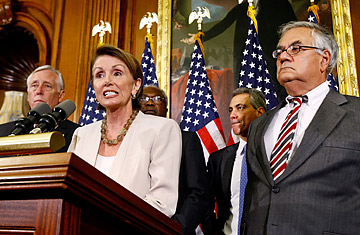
Speaker of the House Nancy Pelosi talks about the failed bailout during a news conference in Washington
Republicans and Democrats talked a lot over the past few days about putting aside their partisan differences for the good of the country to pass a financial markets rescue plan. But they mostly appeared to agree on one thing: that even if they were going to support it, no one much liked the $700 billion bailout bill they had negotiated with the Bush Administration, and certainly no one much wanted to take any credit for it.
So perhaps it shouldn't have come as such a shock when the House of Representatives failed to pass the bill Monday afternoon, or that the rest of the day was spent in partisan fury and recriminations: Democrats blamed Republicans, Republicans blamed the Dems, the House blamed the Senate, the Senate blamed the House, John McCain blamed Barack Obama, Barack Obama blamed — well, you get the picture. Only one player remained relatively restrained in the aftermath of the defeat, which led to a 777-point free fall for the Dow Jones industrial average, the largest single point drop in history, and a market loss of $1.2 trillion. "We're not going to play the finger-pointing blame game, which is what today devolved into," sniffed White House spokesman Tony Fratto.
The most obvious culprits in a legislative meltdown that many warn could take the economy down with it were House Republicans, who had gotten an earful from their constituents disapproving of the bailout and had been strongly against it from the start. After scuttling the first proposed deal last week at a contentious White House meeting, saying they simply didn't have the votes, House Republican leaders forced a renegotiation of the bill, moving it further to the right to make it more palatable to their members. Then, after marathon talks over the weekend, an agreement was struck in the wee hours of Sunday morning, and the GOP House leadership quickly got behind the deal. "We are supporting this bill," House minority leader John Boehner told reporters Sunday night, adding that he was asking members to vote for the measure.
But the rank and file weren't necessarily ready to play follow the leader. Chasing Boehner and his deputies down the Cannon House Office Building's marble stairs, reporters asked if the party's top dogs believed they would get enough votes. They expected "substantial support," barked Representative Roy Blunt, the second ranking House Republican, who represented the House GOP at the negotiations, as he hustled away.
At around 11:30 on Monday morning, as the House drew closer to a vote, Blunt called House majority leader Steny Hoyer to express concern that they might not have the votes. "They thought that momentum would carry it and both sides would keep working; that was the way they left it," said one Democratic leadership aide familiar with the conversation. "No Republican ever asked to pull the bill."
But the two parties have different accounts of what led up to the vote. Two Republican recollections of the same conversation had Blunt informing Hoyer that they were short — Blunt counted 60-some GOP votes and was hopeful they could get as many as 75 — and that Democrats would have to make up the rest. Four Democratic sources dispute this version, insisting that they were always promised between 80-90 GOP votes — still short of the 100 votes that would make up a majority of House Republicans, but enough to qualify as a bipartisan victory.
But even some Republicans remarked that their leaders didn't seem to be trying too hard to get the votes. There wasn't "some of the bursting of arms that I've seen in some votes over the past 12 years," said Representative Chip Pickering, a Mississippi Republican. Why wouldn't there be a harder push on such a crucial bill? "The leaders knew people have deeply held convictions on this," Pickering said. "Everyone knew what the stakes were."
And the stakes became even clearer once the tally started at 1:27 Monday afternoon. By 1:51, 227 members had voted against it - nine votes more than the 218 majority. By 2:02 p.m., Hoyer and Representative Rahm Emanuel, the No. 4 House Democrat, were in animated discussions on the Republican side of the chamber with Boehner and Blunt. Hoyer "was running around in there saying, 'The market is falling! The market is falling!' " said Scott Garrett, a New Jersey Republican. Faced with a major GOP shortfall, Democrats refused to force 12 of their members to change their votes for a bill that they had just spent the past week renegotiating in order to garner Republican support, dropping several provisions important to Democrats. By 2:05 the vote was done, failing to pass by a margin of 228-205. In the end, Republicans delivered 37%, or 65 of their 199 members, compared with 60% of House Democrats who voted for President Bush's "rescue" plan.
Given the beating the stock and bond markets took after the vote, all sides still recognize that something must be passed, and quickly. But with the Jewish New Year celebration starting Monday night, nothing can be done until Wednesday evening at the earliest, and the House is not expected to be back in session until Thursday at noon. Democrats pledged to keep working on a bipartisan basis, though privately many questioned Boehner and Blunt's ability to deliver their fellow party members.
